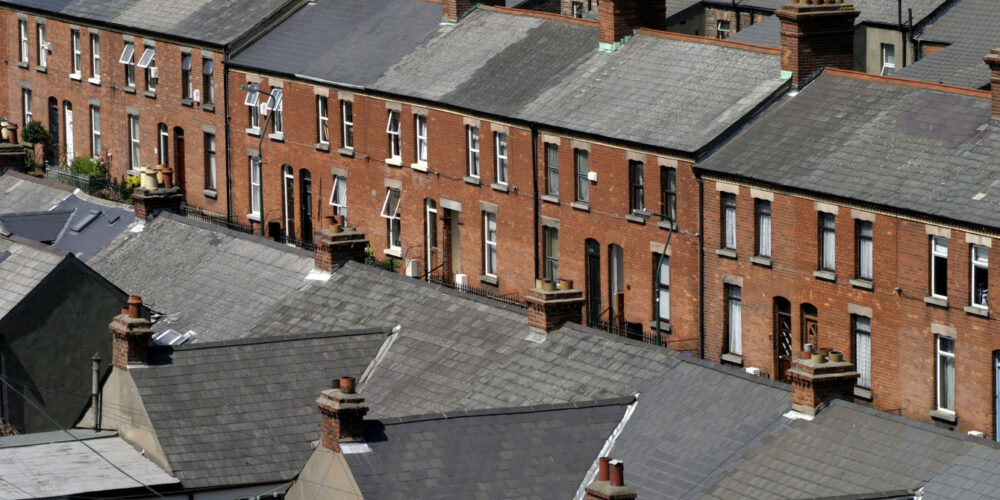The mantra “You need to own your own house” or to “get on the property ladder” has great appeal in the Irish psyche. Young couples will queue outside building sites for days to get their “dream home.” While they wait, and it makes the evening news, the original price of the house creeps up in increments of ten or twenty thousand.
And nobody bats an eyelid. It’s taken as normal practice—a part of life.
Often the houses are not even built yet, and all they see is the well-manicured mocked-up “lived-in” show house. They are keen, and content to buy off the plan. The young couple (and it mostly is young couples) have worked long hours, saved, curtailed their lives, and stayed with parents or in substandard accommodation, just to scrape together the minimum deposit. Parents and even grandparents might chip in too.
All this is viewed as the road to the prize of “owning” your own home. And they don’t even have a home yet. A long list of vultures have to get a slice of the action: the advertisers, the solicitors, the auctioneers, the insurance company, and of course the mortgage company or bank. The government has taxes to get. So have local councils.
The original seller has received an exorbitant price for the land the houses will be built on. They may well have bought the land at a knock-down price, got planning permission, then raised the price ten, fifteen or twentyfold, knowing well that people will even camp outside the building site to buy the eventual houses at inflated and ever-increasing prices.
Then there’s the property mogul or builder. They certainly have a large slice to get, and to get that slice up to the maximum they will do anything it takes. All corners that can be cut will be cut. This is a well-practised art form.
At the outset they will maximise the number of houses or apartments they can possibly squeeze in to the area they have. Green areas, recreational areas or community spaces are not profit-making, so they don’t count too highly in the moneymaking plan. Subcontractors and workers will have their wages cut to the bone. They will be subject to strict time schedules, with penalties. Materials used will be the cheapest that can be got to fit.
Building regulations will be adeptly complied with, where possible. And there are many examples in the recent past of this. The result is a poor-quality house, entirely the result of the race to make a profit at any cost. Your three-bedroom semi-detached house, which you queued for, which you skimped, saved and borrowed for, cost in the region of €300,000 to build, and you will pay perhaps €400,500 to €500,500 for it. It will imprison you for the rest of your life; and you will be unlikely, in the main, to ever own it.
All being well, you might pay off your original mortgage of €400,000 or €500,000 in mid to late life. Of course the original mortgage, plus interest, insurance, and the upkeep of your home, will now have cost you many times the figure of your original mortgage. In the meantime your house may now be worth only half, or less, of your lifetime expenditure. And all the time someone is profiting from your home, which you might not even own yet.
The rental market, as at present constituted, is yet another crucifixion of those wishing to set up home. Private landlords and transnational vulture landlords all strive to screw as much as possible out of the poor and the working poor. Housing and apartment rental in Ireland is, quite simply, extortionate. Government assistance for both buyers and renters only pushes up prices, and results in the money from the government, by way of taxpayers, being transferred to the already rich.
And yet there is another, much simpler way to have a home; but the media, and those with an interest in profit only, will never mention it. Dozens of television programmes promote the notion and the “dream” of buying your own home, in Ireland or abroad. However, in Europe owning your own home is not a big thing. There, public housing, in one form or another, is seen as normal; but here, to be a renter instead of being an owner has a low status attached to it.
People convince themselves that they are “middle-class” when they have a large house, in an affluent area, complete with an equally crippling mortgage; and those who are renting, whether from councils, housing executives or would-be landlords, are somehow lower-class or merely working-class.
This “othering” is very useful to those who wish to cash in on the mistaken notion that an Irishman’s (or woman’s) home is their castle. They rub their hands with glee when they hear this repeated ad nauseam.
Imagine a different approach: that a home is a human right, and treated like food or water—essential to human existence; that the profit motive is removed completely, and that the government built our homes, according to the needs of the population; that the constitution would say you have a home for life, unless you want to change, upgrade, “downsize,” or emigrate.
All these options would be paid for by a rent measured according your ability to pay. It could even be linked to whether you are working or not.
The very first and obvious question would be, How will all this be paid for? The writer is not an expert on these matters; but I would hazard a guess that a raising of the tax rate on the transnational vultures that have caused the price of housing in Ireland to skyrocket would be a start, followed by all the other transnationals that avoid paying tax in Ireland, not to mention our own home-grown vultures. I have no doubt at all that, if the political and ideological will was there, it would be doable.
Just consider how society would change if everyone had a home, at a nominal rent, for life, as a right; further, that those who worked reaped the proper rewards of their labour, a full share in the profits, as of right, coupled with a free health service, free education, and even proper food—not the poor-quality, chemicalised and factory-farmed stuff that is peddled as food to the people. Less illness, less stress, and a more fulfilling life.
At present two parents have to work to pay for their over-priced house or to rent. The majority cannot digress from making ends meet. They are constantly on the edge. It affects how they participate in society (or don’t). It means they cannot afford not to have a job. Unable to pay or fall behind on a mortgage or rent and they are homeless. The landlord or the mortgage company care little about that situation. They have a profit to make, no matter what.
So not alone has the whole system to change but our attitude to what a home is must change too. As part of the development of a New Ireland, public housing by government must become the norm. A home must be deemed a human right; a home must not be for profit.
Ireland could lead the way with progressive action on this.






